You know you’re doing something right when Amos Yee gives you a shout-out (02:34) in the midst of a passionate, funny, enlightening rant. Praise from Caesar is praise indeed.
Category: politics
Dvorak Diary #1: Airport
On a recent trip to Trivandrum, India, I decided to try learning to touch-type in Dvorak (after decades of hunt-and-peck in QWERTY). Here I share some excerpts of my “Dvorak Diary”.
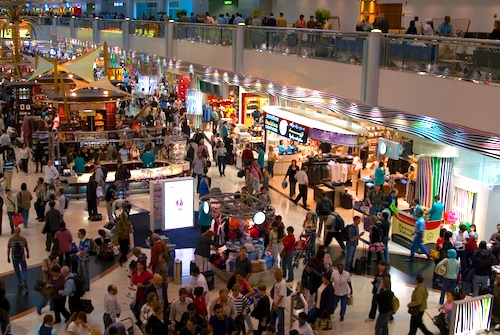
December Twenty-Fifth, Two Thousand Fourteen….
The airport here has two levels. Lower is a huge confusing mall like Heathrow; upper is one huge business class lounge with its own gates. Lower is a dystopian capitalist nightmare; powerless citizens oppressed by armed guards are blasted with ‘luxury’ images and stores. The more oppressed, powerless, and confused the human, the more vulnerable to advertising. The violence behind capitalism is apparent at airports. Armed guards at the periphery, armed guards at every step, and at the center: shopping. But the business class lounge is ad-free and store-free. ‘Luxury’ goods aren’t for the rich and powerful, they’re for the disempowered middle class. They are the only way to gain a sense of power where all other power has been stripped away.
I started typing that at the Dubai airport but finished it here on the plane. That’s how slow a typist I am.
How to Feel Good About Garbage
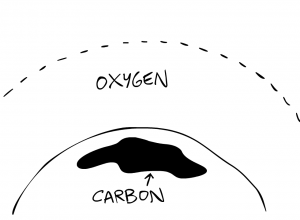
Primitive species turned carbon from Earth’s earlier, carbon-rich atmosphere into more of themselves:
early primitive life (procaryote cells) modified our planet by converting CO2 and H2O to organic matter and releasing oxygen to the environment. As a consequence these organisms moved carbon from the atmosphere to the rocks (Figure 11) and broke down water molecules releasing oxygen to the ocean and eventually to the atmosphere. Life therefore is a powerful force controlling the composition of the Earth’s atmosphere which in turn exerts a powerful control on our planet’s climate. http://eesc.columbia.edu/courses/ees/climate/lectures/earth.html
Now we’re taking that carbon out of the earth and spewing it back into the atmosphere…
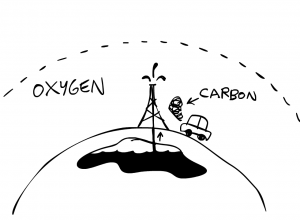
…creating a climate suitable for bacteria and prokaryotes, but not for the complex life forms we cherish today (such as ourselves).
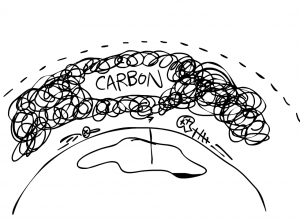
To restore climate balance, we must put carbon back into the earth.
We should throw carbon into large holes, cover them up with layers of rock and soil, and allow them to compress for millions of years, over which time they will again form a viscous underground carbon sludge safely distant from our preferred oxygen-rich air.
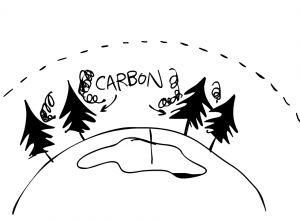
In other words, we should be putting our carbon waste (paper and plastic) in landfills. Not recycling them.
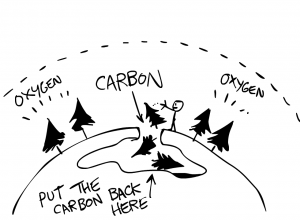
Paper comes from tree farms, which are carbon sinks. In an ideal climate-restoration system, farmed trees would fix atmospheric carbon, become paper, and get buried back into the ground, with earthbound carbon accumulating every year as atmospheric carbon diminishes. By this logic, the junk mail industry is helping the environment, as it converts atmospheric carbon to bury-able waste, paid for entirely by advertisers.
Plastic is made of carbon humans dug up from deep within the Earth as petroleum. If it’s buried it can become petroleum-like again in several million years. If petroleum is burned as fuel, more carbon goes into the atmosphere. Petroleum is more valuable as a plastic source than as a fuel; solar energy can power vehicles but it can’t become plastic (without the intervention of billions of years of photosynthesis and compression).
So bury your paper and plastic (carbon) waste. Bury it in a good landfill.
But recycle metal. It’s much more efficient than mining anew. Metals aren’t carbon. And recycle glass. It’s silicon, not carbon.
Based on numerous conversations with Theodore Gray.
Note: none of this is going to fix the world. We’re all doomed for many reasons. It does however take some air out of the sails of “recycling paper and plastic helps the Earth!!!” The ritual of recycling paper and plastic is mostly just that – a ritual which eases denial of environmental catastrophe in progress. I’m suggesting we can abandon that ritual now.
Update from Theo* (via email):
The thing everyone keeps missing is that none of that matters. The only thing you have to understand is that ALL carbon that can be dug out of the ground in any form, will be. The economic pressure to do so is simply overwhelming, and no one is going to be able to stop it. The ONLY question is whether it will be burned, or made into plastic and thrown away (which keeps it out of the atmosphere).
And the only thing that matters in answering that question is whether there is more money to be made in burning it, or in making it into plastic. What is the relative price of fuel vs. feedstocks for plastic, and what is the relative demand for fuel vs. for plastic. Right now it’s evenly enough matched that a lot goes into both, but if something tips the balance towards it’s being worth much more for plastic, there would be a massive worldwide switch away from burning it. No need for demonstrations, it would just happen.
Things that can tip the balance in that direction are:
- Cheaper alternatives for fuel, so wind power, hydrogen from solar, etc, etc.
- Things that increase demand for plastic.
It’s in item number 2 that recycling comes into play. If you recycle paper, that lets people make more paper packaging instead of using plastic. If you recycle plastic, that keeps it out of the landfill (where it belongs and can do some good) and returns it to the market to compete with virgin plastic, thus reducing the demand for oil to make new plastic, thus diverting more carbon into the atmosphere.
Burying paper also has the side effect of removing even more carbon from the air because it’s made out of carbon from the air, but that’s only one reason for doing it. Helping increase the price of plastic is at least as important a reason.
No questions about how much fuel it takes to do any of these things is relevant. The fuel is going to get burned. Exponential growth has no mercy: The carbon IS going to be dug out of the ground, nothing can stop that, all we can do is try to re-bury as much of it as fast as we can.
*Please note Theo’s opinions are his own; I’m sharing them here because I think they’re interesting and worth discussing.
Copycamp Talk
“40 Years in the Desert,” a talk I gave at Copycamp in Warsaw, Poland, on November 26 2012. Audio is a bit messed up until 02:49, so just start there. I talk a bit about Questioncopyright.org and Minute Memes, liberally quote Rick Falkvinge, mention Fair Use and Creative Commons before getting into Intellectual Disobedience. Toward the end I discuss Seder-Masochism’s release plan.
A Jewish State
Last night I finally watched Exodus, as research for my Seder-Masochism project. It was actually a much better movie than I expected. The film is mainly about showing a very hot young 1960 Paul Newman from various angles, mostly in sexy profile but sometimes portrait, but it’s also about the pressures that created Israel, and very sympathetic to the desire for a Jewish Homeland. Today, fortunately, we have this excellent alternative:
I’d move there.
Copying Is Still Not Theft
Over at Techdirt.com, pro-SOPA/PIPA commenters continue to call copying “theft.” Since their main argument for breaking the Internet is fundamentally erroneous, now seems like a good time to re-post this riposte:
Please share.
